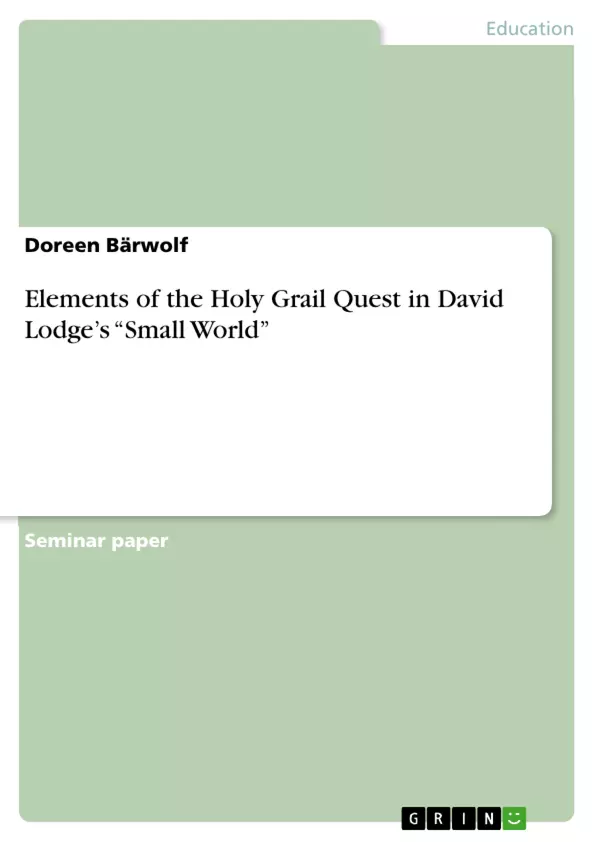David Lodge was born 1935 in South London as the child of a Jewish father and a Catholic mother. He was raised in the middle class and went to Catholic schools. With the age of 22 he became postgraduate student for English literature at the University college of London. In 1960 he became a lecturer at the Birmingham University and published his first novel The Picturegoers. Being a lecturer he discovered the field of literary criticism and wrote his first critical book Language of Fiction. After touring the USA and studying at the Brown University and at Berkeley he was so inspired by travelling and the academic world that he wrote Changing Places. This academic novel about travelling teachers of literature was the first part of a trilogy together with Small World and Nice Work. All three of them were pioneering for modern fiction of the 20th century. For Changing Places David Lodge won the Hawthornden Prize and the Yorkshire Post Fiction Prize. Small World, as well as Nice Work, were shortlisted for the Booker Prize and Nice Work was Sunday Express Book of the year and actually adapted for Television. All three of them showed the academic world in a new light. After World War II more people from middle class went to Universities and the competition between the Universities as well as the scholars became harder. Travelling around the world from conference to conference was on the day’s schedule of every scholar. David Lodge used this milieu and mixed it with humour and sarcasm and so innovated fiction writing of today.
This paper is about David Lodge’s Small World and its linking to the King Arthur myth especially to the knight Perceval and the Holy Grail. The connection between the novel and the legend results from David Lodge’s knowledge of both, the academic world and the medieval literature. He mixed them so to create a modern version of Perceval’s quest for the Holy Grail.
Inhaltsverzeichnis (Table of Contents)
- INTRODUCTION
- SMALL WORLD – A SHORT SUMMARY
- THE GRAIL LEGEND ACCORDING TO CHRÉTIEN DE TROYES AND WOLFRAM VON ESCHENBACH
- CHRÉTIEN DE TROYES
- WOLFRAM VON ESCHENBACH
- INTERPRETATION OF LODGE'S SMALL WORLD ACCORDING TO WOLFRAM'S PARZIVAL
- THE HOLY GRAIL THEME
- THE PARZIVAL AND WASTE LAND THEME
Zielsetzung und Themenschwerpunkte (Objectives and Key Themes)
This paper examines the connections between David Lodge's novel Small World and the Arthurian legend, specifically the story of Perceval and the Holy Grail. It explores how Lodge, drawing on his knowledge of both the academic world and medieval literature, weaves these elements together to create a modern retelling of Perceval's quest.
- The portrayal of the academic world in Small World and its parallels to the Arthurian legend
- The themes of love, desire, and the search for meaning in both the novel and the Grail legend
- The role of the Holy Grail and its symbolic significance in Lodge's narrative
- The connection between Perceval's quest and Persse McGarrigle's journey in the novel
- The use of satire and humor in Lodge's work to highlight the absurdity and complexities of modern life
Zusammenfassung der Kapitel (Chapter Summaries)
- Chapter 1: Introduction This chapter introduces the novel Small World and its main character, Persse McGarrigle, a young literature professor. The chapter details Persse's quest for Angelica Pabst and his encounters with other academics, such as Morris Zapp and Miss Maiden.
- Chapter 2: Small World - A short summary This chapter provides a detailed summary of Small World, focusing on Persse's journey to find Angelica and the various characters he meets along the way, including Morris Zapp, Phillip Swallow, and Cheryl Summerbee.
- Chapter 3: The Grail Legend according to Chrétien de Troyes and Wolfram von Eschenbach This chapter examines the two primary versions of the Perceval and the Grail story, comparing and contrasting the works of Chrétien de Troyes and Wolfram von Eschenbach.
Schlüsselwörter (Keywords)
This paper focuses on the connections between David Lodge's novel Small World, the Arthurian legend, the Holy Grail theme, the Waste Land theme, academic satire, modern literature, and the quest for meaning.
Frequently Asked Questions
Who is David Lodge?
A British author and academic born in 1935, famous for his academic trilogy: Changing Places, Small World, and Nice Work.
How does "Small World" link to the Holy Grail?
Lodge uses the academic world (conferences, tenure searches) as a modern setting for a "quest," mirroring the medieval search for the Holy Grail.
Who is Persse McGarrigle?
The protagonist of Small World, a young literature professor whose search for Angelica Pabst parallels Perceval's quest for the Grail.
What is the "Waste Land" theme in the novel?
It refers to the spiritual and intellectual sterility of the modern academic world, drawing parallels to T.S. Eliot's poem and the Arthurian myth.
Why does Lodge use satire in his academic novels?
To highlight the absurdity, competition, and human frailties within the global community of scholars and university life.
- Quote paper
- Doreen Bärwolf (Author), 2008, Elements of the Holy Grail Quest in David Lodge’s “Small World”, Munich, GRIN Verlag, https://www.hausarbeiten.de/document/156443


